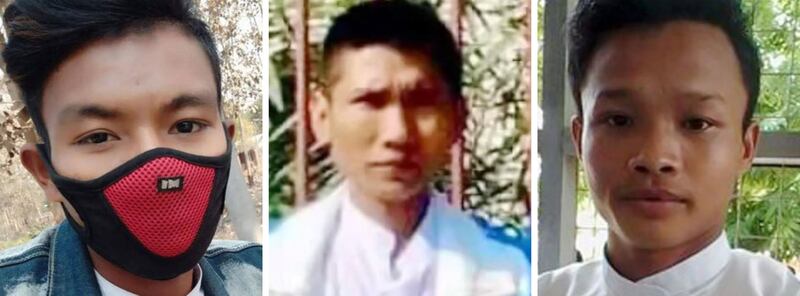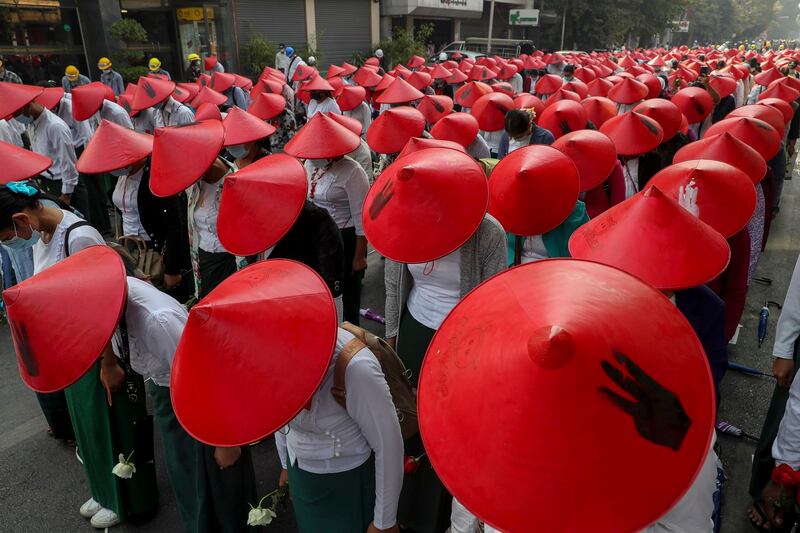The police vehicle pulled up to the house on a September evening and three officers got out. They demanded to see Kyaw Naing Win, a secondary school teacher who had refused to go to work as part of the country’s Civil Disobedience Movement after the February 2021 military coup.
They quickly shoved him into the vehicle, where they beat him before they drove off into the night, a person close to the teacher said, speaking anonymously for fear of reprisal.
Hours later, with no word from her husband, Kyaw Naing Win’s wife went to the chief administrator’s office in Wundwin township in central Myanmar’s Mandalay region to find out what had happened to him.
“They told her that they were going to keep him for the night as they had some questions to ask him,” the source said. His wife wasn’t allowed to see him and then was told he had been taken to Meiktila town for further interrogation.
Three days later, the police informed his family that he was dead.
“When the family went to Meiktila prison to get his body, the authorities said that they could not provide it as they had already cremated him,” the source said.
No cause of death was provided to his family members, who have since fled their home and gone into hiding, afraid that they will also be targeted.
250,000 strong
Kyaw Naing Win’s story is an increasingly common one nearly two years after the takeover for public school teachers who have boycotted their government jobs to protest military rule, which began two years ago on Wednesday, Feb. 1.
More than 250,000 education workers across the country have joined the non-violent, anti-junta Civil Disobedience Movement, or CDM, the shadow National Unity Government said last year.
Of those, junta authorities have killed at least 33 and arrested 218 others as of the end of 2022, according to statistics compiled by the Thailand-based Assistance Association for Political Prisoners (Burma).
One school teacher who is fighting the military as part of the country’s armed resistance said that the junta is taking revenge against educators in the movement because they are impacting its ability to rule.
“Educators joined the CDM movement in droves – that’s why the military cannot operate as it expected,” he said.
“They think that if all the CDM educators abandoned their cause and returned to work, they would be able to control the education sector and show the international community that people accepted the coup. They think these actions will frighten CDM educators into returning to their jobs.”
Death penalty
Educators told RFA that the junta has imposed long prison terms and even the death penalty on teachers and school staff arrested for defying the coup.
Kaung Khant Kyaw became the first educator supporting the CDM to receive the death penalty when he was sentenced by the junta’s Hinthata District Court in Ayeyarwady region on Dec. 30, 2022 for allegedly killing a military informer.

The 25-year-old elementary school teacher at the Hteik Poke Kone school in Ayeyarwady’s Myan Aung township, who was charged under Myanmar’s Anti-Terrorism Law, is currently being held at Pathein Prison, according to a source close to his family.
Among those serving hefty prison terms is 27-year-old Aung Htay Phyo, a primary school teacher in Magway region’s Myo Thit township.
One of the earliest participants in the Civil Disobedience Movement, Aung Htay Phyo was eating at a restaurant at the invitation of a friend when authorities interrupted his meal and told him that he was on a list of people to be arrested, a friend told RFA.
“He was beaten and tortured after his [September] arrest and had to receive medical treatment at Taungdwingyi Hospital,” said the friend, who also declined to be named.
On Dec. 28, he was handed a 15-year jail term and sent to Duang Nay Chaung Prison, the friend said.
‘Causing chaos’
Attempts to reach Deputy Information Minister Major Gen. Zaw Min Tun for comment went unanswered, but the junta spokesman has previously said that authorities are obligated to “take appropriate legal action against those who are causing chaos.”

Other sources in the education sector told RFA that the junta is even trying to destroy the livelihoods of participants in the movement by restricting them from teaching at private schools.
“Teachers joined the CDM only because we do not support military rule, but we should have the right to teach in any private school setting,” she said. “If we don't teach, our children will suffer. It is really unbearable to see the military oppressing CDM educators just for taking part in educational activities.”
She vowed to continue to participate in the CDM movement, despite the military’s targeting of education workers.
“The military has detained educators, sentenced them to long prison terms, and even killed them,” she said. “All teachers find such actions unacceptable and we seriously condemn them.”
Translated by Myo Min Aung. Edited by Joshua Lipes and Malcolm Foster.
